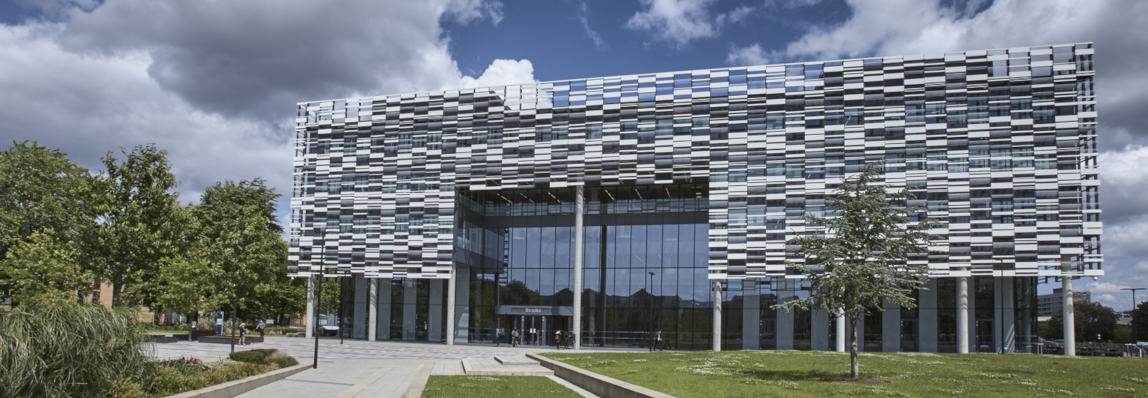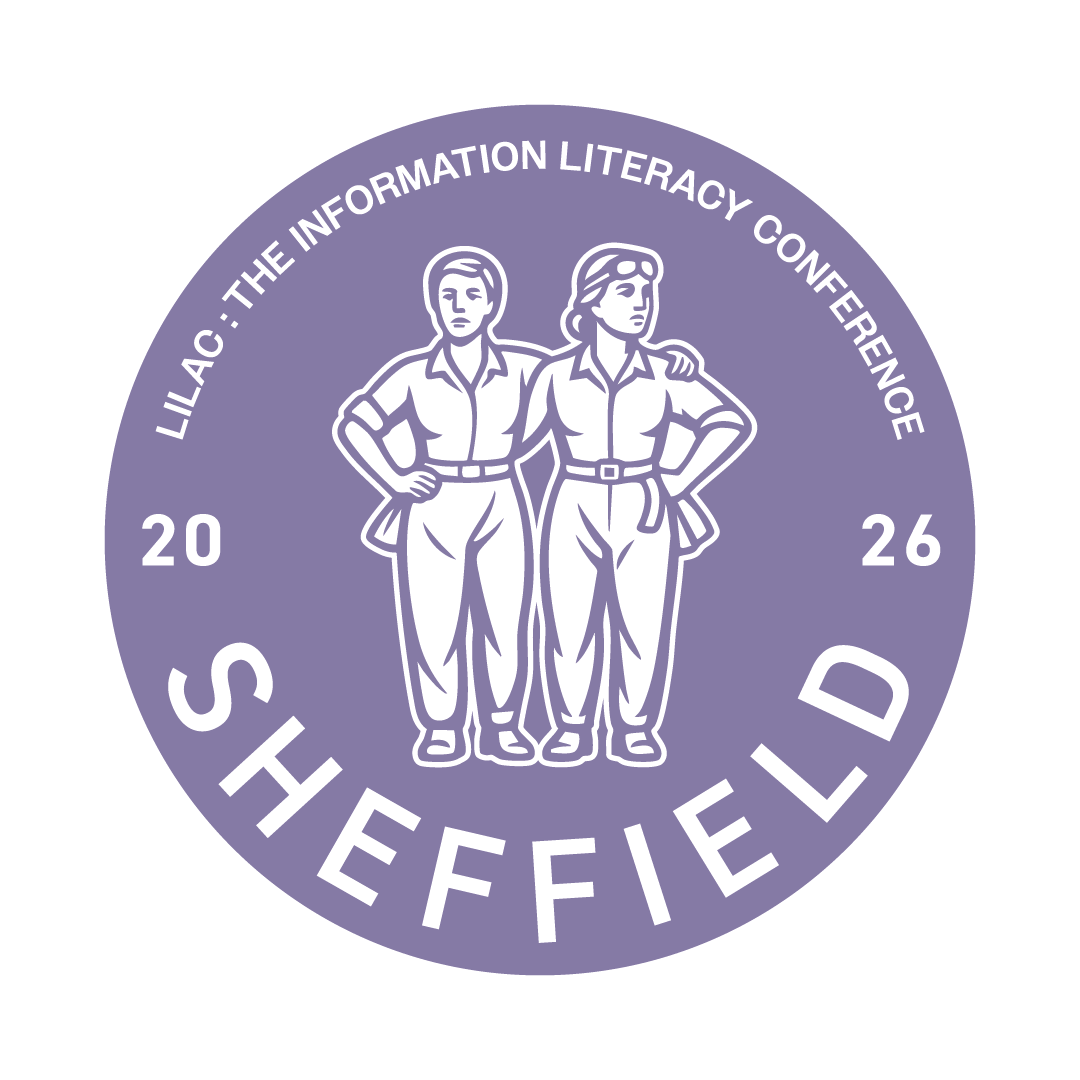

A selection of photos from the conference can be found on our flickr (more coming soon!). You can also download a copy of our full programme complete with abstracts.
Susan Connor, Ray Smith (he/they), Imogen Webb (she/her), Rachel Wilding (she/her) (Manchester Metropolitan University’s iSchool) - Student Panel
Marilyn Clarke (Director of Library Services at Goldsmiths, University of London) - Decolonisation as a means to creating an equitable future
Emily Drabinski (Critical Pedagogy Librarian at the Graduate Center, City University of New York) - Structure and Power: Information Literacy for Liberation
Elliott, J. & Manecke, U. B. (2022) LILAC 2022: A reflection on inclusivity [Online]. Available at: https://ojs.lboro.ac.uk/JIL/article/view/CR-V16-I1-3 (accessed: 08 June 2022).
Garcia Grau, E. (2022) LILAC 2022: A reflection on librarians as teachers [Online]. Available at: https://ojs.lboro.ac.uk/JIL/article/view/CR-V16-I1-2 (accessed: 08 June 2022).
Ingle, E. (2022) LILAC 2022: Origami bees and sunflower seeds [Online]. Available at: https://information-studies.blogspot.com/2022/05/lilac-2022-origami-bees-and-sunflower.html (accessed: 16 May 2022).
Jenkins, R. (2022) And we're back (in person!) - the LILAC conference [Online]. Available at: https://kangarooth.wordpress.com/2022/04/19/and-were-back-lilac22-conference-in-person/ (accessed: 20 April 2022).
Kirschbaum, A. (2022) LILAC 2022: Amongst one's own [Online]. Available at: https://information-studies.blogspot.com/2022/05/lilac-2022-amongst-ones-own.html (accessed: 16 May 2022).
McKinney, P. & Webber, S. (2022) Information Literacy Weblog (#lilac22 blog posts) [Online]. Available at: https://information-literacy.blogspot.com/search/label/LILAC22 (accessed: 20 April 2022).
Napthine-Hodgkinson, J. (2022) LILAC 2022: Conference report [Online]. Available at: https://ojs.lboro.ac.uk/JIL/article/view/CR-V16-I1-1 (accessed: 08 June 2022).
Secker, J. (2022) LILAC coloured joy and focus [Online]. Available at: https://janesecker.wordpress.com/2022/04/19/lilac-coloured-joy-and-focus/ (accessed: 20 April 2022).
Semple, N. (2022) Live Highlights: LILAC Conference Day 1 [Online]. Available at: https://nicolasemple.co.uk/2022/04/11/lilac-conference-2022-day-one/ (accessed: 20 April 2022).
Semple, N. (2022) Live Highlights: LILAC Conference Day 2 [Online]. Available at: https://nicolasemple.co.uk/2022/04/12/lilac-conference-2022-day-two/ (accessed: 20 April 2022).
Semple, N. (2022) Live Highlights: LILAC Conference Day 3 [Online]. Available at: https://nicolasemple.co.uk/2022/04/13/lilac-conference-2022-day-three/ (accessed: 20 April 2022).
Woods, L. (2022) LILAC 2022: Reflections [Online]. Available at https://woodsiegirl.wordpress.com/2022/04/18/lilac-2022-reflections (accessed: 20 April 2022).
Woods, L. (2022) Social justice: the LILAC keynotes [Online]. Available at: https://woodsiegirl.wordpress.com/2022/04/19/social-justice-the-lilac-keynotes (accessed: 20 April 2022).
Woods, L. (2022) Underdtanding library users to support change [Online]. Available at: https://woodsiegirl.wordpress.com/2022/04/20/understanding-library-users-to-support-change/ (accessed: 20 April 2022).
Augustine, K. & Hollcraft, J. Implementing the question formulation technique in a first-year composition course throughout the pandemic
Bagger, A., Ramsgaard, L. & Tang, H. Educational design patterns: going beyond the classic information literacy concept
Belantara, A. & Drabinski, E. Sharing information literacy concepts through sound: sounding the radical catalog
Bickley, R. Information literacy as activism: standing up to the academic e-book industry
Brittle, K. & Newbigging, C. Are you a teaching librarian? How two ‘imposters’ grew a library help centre
Brookbank, E. Serving and supporting students as whole people
Courtney, M. Critical global citizenship in and out of the classroom: incorporating community-based global learning and cross-cultural information literacy in an undergraduate course
Dawes, L. & Anaya, T. Is hybrid here to stay? Developing flexible instruction that support community inquiry and active learning
Dunlop, S. The future of feedback: evaluation of information and digital literacy teaching in higher education
Flood, J. & Coxhead, B. Critical sustainability research workshop: an example from UAL Libraries' Sustainability Toolkit
Goldstein, S., Secker, J. & Harding, A-L. MILA Framework workshop
Haigh, J. Evaluating the impact of LILAC through long term reflections and inspiration mapping a workshop to generate ideas
Hamlett, A. Laying the foundation how faculty led IL instruction improves students success
Harding, A-L. Introducing information literacy at the House of Commons
Haworth, A., Grant, V., McIndoe, S., Sadler, R. & Taylor, D. Moving forward as one University: the impact of reshaping information and digital literacy to integrate with refreshed graduate attributes
Hicks, A. Mutual interest: driving forward the health information literacy agenda
Howard, H. & Phillips, M. Transitioning from academia to the workplace: information literacy experiences of business students
Inskip, C., Hicks, A., Lloyd, A., Mckinney, P. & Walton, G. Leveraging information literacy: mapping the conceptual influence and appropriation of information literacy in other disciplinary landscapes
Jenkins, R., Love-Rodgers, C. & Dozier, M. Librarian consultations - supporting student researchers in the hybrid world
Kaufmann, K. Factors that impact the relevance of information literacy to college students: the kaleidoscope effect
Lincoln, H. & Chiu, T. Perceptions of the ‘find it out yourself method’: developing self efficacy and students as tourists in academic communities of practice
Long, J. & Hicks, J. Maker literacy: connecting IL within the maker movement
Love-Rodgers, C. & McDonald, S. L. Catapulted by COVID: hitting new information literacy targets at the University of Edinburgh
Maniates, R. Revisiting the one-minute paper: personal reflections student engagement and assessing the assessment
Maybee, C. & Kaufmann, K. Information literacy: elements of a maturing discipline
McAndrew, E. Wikipedia student activism and the Ivory Tower
Mckinney, P. & Webber, S. Using theories of change to evaluate information literacy initiatives
Minta, L., Gregory, N. & Thompson, E. Breaking out of the library bubble: information literacy and curriculum alignment
Morrison, C., Secker, J., Wakaruk, A. & Gareau-Brennan, C. COVID and the copyright literacy community of practice
Naughton, J. & Robertson, S. Turning a challenge into an opportunity: health literacy training for NHS knowledge and library staff
Nierenberg, E. & Dahl, T. I. The development of students as information literate individuals: results from an 86% complete PhD in information literacy
Panes, M. & Mellifluo, L. Community building in complex settings: exploration based on Swiss multi-library initiatives for gamifiers
Pavey, S. Looking for information literacy in the English National Curriculum and exam syllabi
Pavey, S. What if no-one had information literacy skills?
Peppard, C., Parkhill, S. & Chalkley, A. Self service or checkout confusion?
Phillps, K. & Joel Burkholder, J. A wolf in sheep’s clothing: genre confusion and Fake News
Preest, K. & Sewell, C. Increasing inclusivity: developing a HEA accredited teaching course for librarians
Randall, S., Naylor, N. & Wills, D. Trusted information in unprecedented times: reflecting on two years of learning from the PIF TICK trust mark for health information
Secker, J., Tilley, E., Mizrachi, D. & Grim, G. Students academic reading and information literacy in a time of COVID
Soderman, J. The power of collaging in unlocking research topics
Thomson, K. Teaching how to structure literature reviews via 1990s movies
Thorpe, C. & Paterson, F. Supersize my session. Reflections on redesigning a small scale workshop for a large scale setting in-person and online
Trowell, C. & Meehan, L. Reuse recycle repurpose - moving from a plagiarism guide to a sustainable good academic practice toolkit
Usova, T. Teaching data visualization as a one-credit course
Walsh, A. Changing signature pedagogies for information literacy
Wegener, D. Information literacy in Asia: the case at the Singapore Institute of Technology
Westbury, M. & Hicks, A. JIL: Getting your writing groove back
Whitworth, A. Information in isolation: the arrival of high speed internet in a very remote country
Wilkinson, E. & McCartney, C. Pestalozzian principles in post-Covid praxis: IL through a musicians eye
Williams, J., Hicks, A., Baer, A., Hollister, C. & Westbury, M. Prioritising Inclusion and Equity in Information Literacy Scholarship: A Panel Conversation with the Editors of CIL and JIL
Woodcock, J., O'Hara Mia & Pothecary, J. Developing a systematic review search strategy through online and peer active review
LILAC is great opportunity for our fellow professionals to present their ideas, share best practice and show case new thinking in our sector. If you have an idea then we'd love to hear about it. We have many options for the types of sessions you might run from a symposium to a workshop. Visit our Call for Presentations page to find out how to apply.
Places at this year's conference are likely to be in demand more than ever before. Each year our conference grows increasingly popular and this year promises to be no different. Don't miss out and book your place now for this year's conference.
We look forward to seeing you there!
